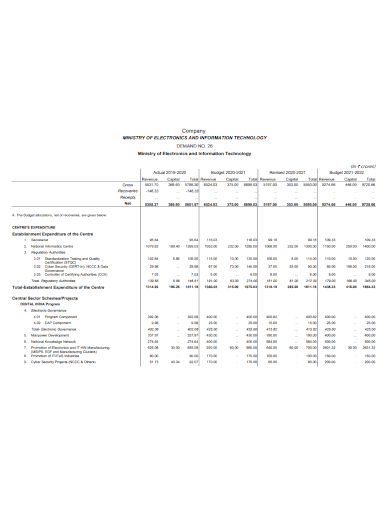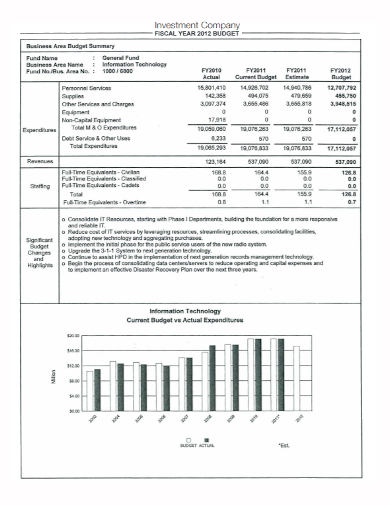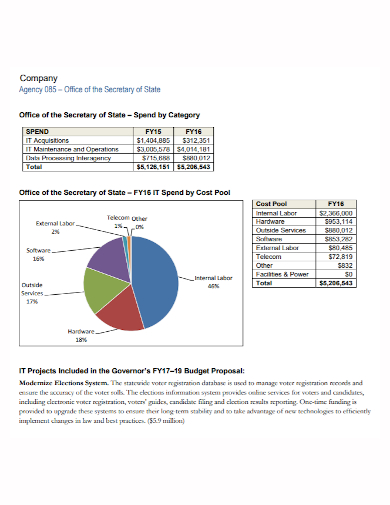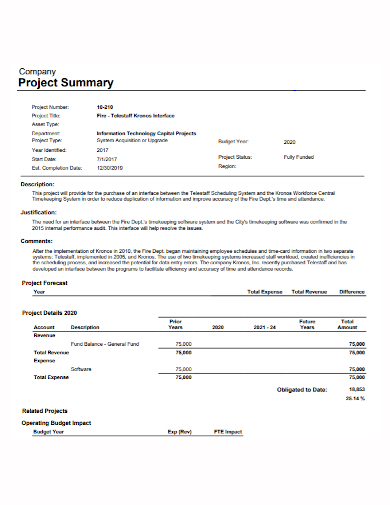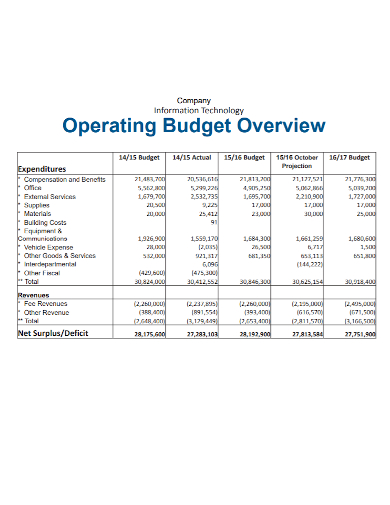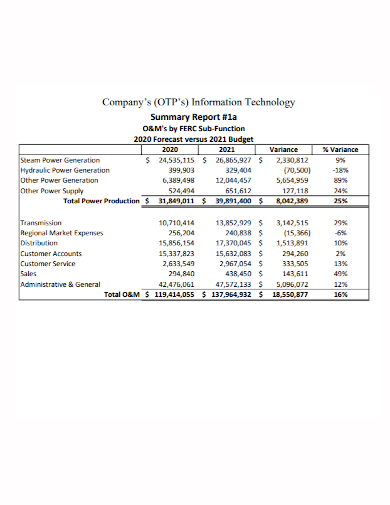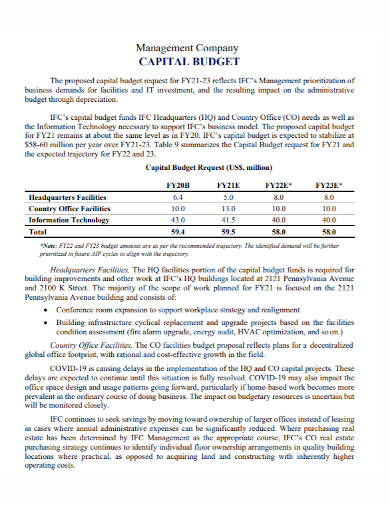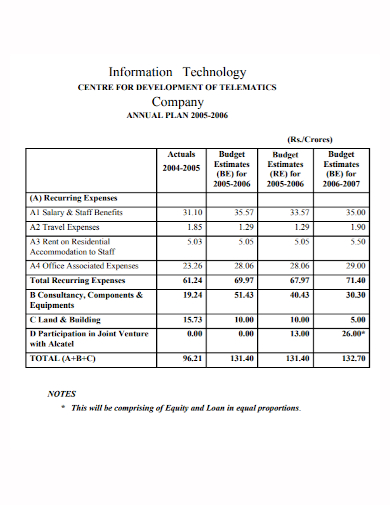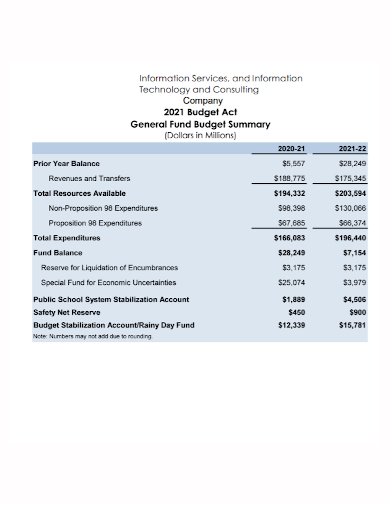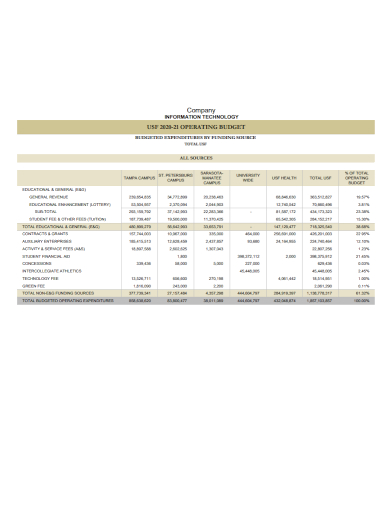Budgeting for information technology (IT) is a challenge for all types of businesses. This frequently occurs as a result of the IT team’s lack of understanding of the budgeting process and the finance team’s lack of understanding of IT. CPAs in public practice, business and industry, the not-for-profit sector, and government can bridge this gap by transforming their organization’s IT budgeting process from a one-time “make it fit” exercise to a long-term planning and management process. This shift necessitates more than simply entering data into a spreadsheet. It necessitates collaboration among an organization’s leaders to define IT’s role in achieving the organization’s goals, transforming IT from a cost center to an investment.
10+ IT Company Budget Samples
The IT budget is the total amount of money spent on IT by the company over a 12-month period. IT spending/budgeting can come from any part of the company that incurs IT costs, not just the IT department. It includes estimates of decentralized IT spending and/or shadow IT from businesses. The IT budget covers the costs of hardware, software, personnel, outsourcing, disaster recovery, and office space required to support IT within the company. All taxes are also included in the price (except value-added tax where it is recovered or refunded to the organization).
1. IT Company Budget Template
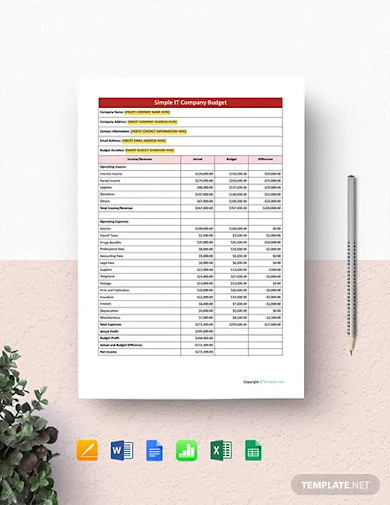
2. Electronics IT Company Budget
3. IT Business Company Budget
4. IT Agency Company Budget
5. IT Company Project Budget
6. IT Company Operating Budget
7. IT Company Budget Summary
8. IT Management Company Capital Budget
9. IT Company Annual Budget
10. IT Company Fund Budget
11. Sample IT Company Budget
Budget Components
The cost of compensation for IT professionals is included in the IT budget. An IT budget also includes costs for developing and maintaining enterprise-wide and so-called back-office systems. These include applications such as enterprise resource planning (ERP), accounting, finance, and human resource management.
Hardware expenses are typically paid out of the IT budget; bills for laptops, company-issued mobile devices, servers, routers, and other networking equipment, for example, are typically paid out of the IT budget. Datacenter expenses and cloud platform bills are two other costs that are typically included in the IT budget.
Applications deployed for and used by specific business units are examples of items that tend to fall outside the IT budget. Marketing applications, such as those that enable social media campaigns and content management systems, are examples of this; these costs are more likely to be allocated to marketing rather than IT.
Approval Process
Although the CIO is in charge of the IT budget, he is not the only one who designs and approves the overall package. Indeed, CIOs frequently devise and manage technology budgets in collaboration with executive IT steering committees, other executives and directors, and other information chief executives, such as the chief digital officer, chief data officer, and chief analytics officer, even for technology spend that falls within the IT department and thus with centralized IT budgets.
While the IT budget rarely covers all of an organization’s technology expenses, best practices dictate that the IT department compile a comprehensive picture of all technology costs, regardless of where they are located. This allows IT leaders and the rest of the C-suite to ensure that there are no redundancies between the centralized IT budget and the budgets of other business units, resulting in lean and controlled IT spending.
FAQs
What do personal financial planners consider?
Personal financial planners must consider each client’s short- and long-term constraints—for example, are current earnings, deduction limitations, or even current life-stage expenses (for example, school costs for children) limiting the client’s ability to save or invest? IT budgeting has a similar concern with constraints. What is the cash flow of the company? What impact will IT spending have on the company’s overall capital and operating budgets? Are there any major projects underway that could have an impact on the IT infrastructure? Keep in mind that IT-related initiatives have both financial and non-financial consequences.
How do you align the IT company budget with the organization’s strategy?
After a client’s individual investment and savings options have been chosen, a good financial planner will evaluate the plan as a whole to see if it will help the client meet his or her financial objectives. In the same way, the IT budget works. Organizations should take a step back from the details and look at the big picture after evaluating and budgeting for IT initiatives. The next step is to validate IT’s role in the organization. The IT budget is frequently treated as a single lump. It does, however, have three distinct components. These elements are referred to as Run, Grow, and Transform by Gartner, an information technology research firm.
When you consider IT spending as an investment in your company’s future, you’ll notice that it has a lot in common with personal financial planning. Personal financial planners must first understand their clients’ short- and long-term goals in order to provide appropriate savings and investment advice. CPAs working on an IT budget are in the same boat. CPAs can only help ensure that the organization’s IT strategy is aligned with its business strategy, resulting in the right IT investment decisions, after learning about the organization’s short- and long-term goals.
Related Posts
FREE 10+ Expense Budget Samples in MS Word | Google Docs | Google Sheets | MS Excel | PDF
FREE 4+ Vacation Budget Planner Samples in PDF
FREE 10+ Budget Outline Samples in PDF | MS Word
FREE 10+ Conference Budget Samples in MS Word | MS Excel | Google Docs | Google Sheets | Apple Pages | PDF
FREE 10+ Monthly Budget Worksheet Samples in PDF | MS Word | Google Docs | Google Sheets | Excel
FREE 10+ Monthly Project Budget Samples in MS Word | MS Excel | Google Docs | Google Sheets | PDF
FREE 10+ Corporate Budget Samples in MS Word | MS Excel | Google Docs | Google Sheets | PDF
FREE 9+ Primary School Budget Samples in MS Word | Google Docs | Google Sheets | MS Excel | PDF
FREE 10+ Operational Budget Samples in PDF | DOC
FREE 5+ Budget Layout Samples in PDF
FREE 6+ Paycheck Budget Samples in PDF | MS Word
FREE 10+ Architecture Budget Samples in PDF
FREE 10+ Capital Budget Samples in PDF | MS Word | Google Docs | Google Sheets | Excel | Apple Numbers | Apple Pages
FREE 10+ Budget Tracker Samples in PDF | DOC
FREE 4+ Corporate Monthly Budget Samples in MS Word | Google Docs | Google Sheets | Excel

